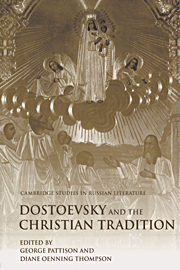Book contents
- Frontmatter
- Contents
- Notes on contributors
- Acknowledgments
- Notes on conventions and abbreviations
- Introduction: Reading Dostoevsky religiously
- PART I DOSTOEVSKY AND THE PRACTICE OF ORTHODOXY
- PART II DOSTOEVSKY AND CHRISTIAN THEOLOGY
- PART III READING DOSTOEVSKY RELIGIOUSLY: CASE STUDIES
- 9 Towards an iconography of Crime and Punishment
- 10 Pavel Smerdyakov and Ivan Karamazov: The problem of temptation
- 11 Beyond the will: Humiliation as Christian necessity in Crime and Punishment
- 12 Freedom's dangerous dialogue: reading Dostoevsky and Kierkegaard together
- Bibliography
- Index
- CAMBRIDGE STUDIES IN RUSSIAN LITERATURE
10 - Pavel Smerdyakov and Ivan Karamazov: The problem of temptation
Published online by Cambridge University Press: 02 December 2009
- Frontmatter
- Contents
- Notes on contributors
- Acknowledgments
- Notes on conventions and abbreviations
- Introduction: Reading Dostoevsky religiously
- PART I DOSTOEVSKY AND THE PRACTICE OF ORTHODOXY
- PART II DOSTOEVSKY AND CHRISTIAN THEOLOGY
- PART III READING DOSTOEVSKY RELIGIOUSLY: CASE STUDIES
- 9 Towards an iconography of Crime and Punishment
- 10 Pavel Smerdyakov and Ivan Karamazov: The problem of temptation
- 11 Beyond the will: Humiliation as Christian necessity in Crime and Punishment
- 12 Freedom's dangerous dialogue: reading Dostoevsky and Kierkegaard together
- Bibliography
- Index
- CAMBRIDGE STUDIES IN RUSSIAN LITERATURE
Summary
Literary reputations exist (of writers, of books, of fictional characters), which are to such an extent firmly established that they seem almost givens of their age and are in any event unshakeable. At times, this unshakeabihty can be explained solely by the inertness of our perception. Thus does the interpretation of a certain character or novelistic situation, laid down at some point in the past, migrate from work to work, acquiring with time the appearance of an axiom that requires no proof. This happens most often in those instances when for some reason the character or situation seems to us secondary or ‘not the main thing’ – and consequently the conception of the whole does not depend upon its resolution. As regards other situations, however, it is worth while pausing and considering whether they are in fact secondary and of little importance. This is especially the case with the novel under consideration, an artistic work in which even secondary details can elucidate a great deal for us about the writer's creative plan and position.
The opinion that Pavel Smerdyakov is nothing other than an obedient tool in the hands of Ivan Karamazov, no more than the executor of his evil will, was already voiced in the nineteenth century by Orest Miller: ‘Unfortunate Smerdyakov, having blindly subordinated himself to Ivan's ideal <…> committed the crime.’ Since then, with various degrees of complexity and evidence but most often simply in passing (for this is, after all, a secondary question; what interests us in the novel is the conflict between Good and Evil, the Grand Inquisitor, etc.), it is affirmed that ‘Smerdyakov is only the practical agent of criminality.
- Type
- Chapter
- Information
- Dostoevsky and the Christian Tradition , pp. 189 - 225Publisher: Cambridge University PressPrint publication year: 2001
- 6
- Cited by

